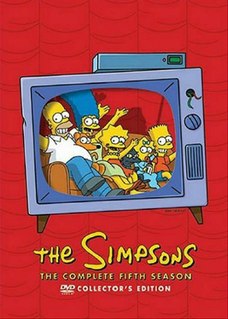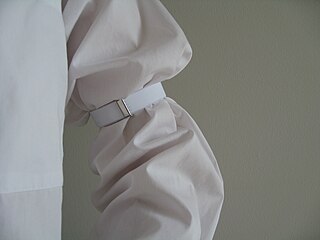A cappella music is group or solo performance without instrumental accompaniment, or a piece intended to be performed in this way. The term a cappella was originally intended to differentiate between Renaissance polyphony and Baroque concertato style. In the 19th century, a renewed interest in Renaissance polyphony coupled with an ignorance of the fact that vocal parts were often doubled by instrumentalists led to the term coming to mean unaccompanied vocal music. The term is also used, albeit rarely, as a synonym for alla breve.

Barnard Arnold Gumble is a recurring character in the American animated TV series The Simpsons. He is voiced by Dan Castellaneta and first appeared in the series premiere episode "Simpsons Roasting on an Open Fire".

A barber is a person whose occupation is mainly to cut, dress, groom, style and shave men's and boys' hair or beards. A barber's place of work is known as a "barbershop" or a "barber's". Barbershops are also places of social interaction and public discourse. In some instances, barbershops are also public fora. They are the locations of open debates, voicing public concerns, and engaging citizens in discussions about contemporary issues.

A barbershop quartet is a group of four singers who sing music in the barbershop style, characterized by four-part harmony without instrumental accompaniment, or a cappella. The four voices are: the lead, the vocal part which typically carries the melody; a bass, the part which provides the bass line to the melody; a tenor, the part which harmonizes above the lead; and a baritone, the part that frequently completes the chord. The baritone sings either above or below the lead singer as the harmony requires. Barbershop music is typified by close harmony— the upper three voices generally remain within one octave of each other.

The Barbershop Harmony Society, legally and historically named the Society for the Preservation and Encouragement of Barber Shop Quartet Singing in America, Inc. (SPEBSQSA), is the first of several organizations to promote and preserve barbershop music as an art form. Founded by Owen C. Cash and Rupert I. Hall in Tulsa, Oklahoma in 1938, the organization quickly grew, promoting barbershop harmony among men of all ages. As of 2014, just under 23,000 men in the United States and Canada were members of this organization whose focus is on a cappella music. The international headquarters was in Kenosha, Wisconsin for fifty years before moving to Nashville, Tennessee in 2007. In June 2018, the society announced it would allow women to join as full members.
The Haydn Quartet, later known as the Hayden Quartet, was one of the most popular recording close harmony quartets in the early twentieth century. It was originally formed in 1896 as the Edison Quartet to record for Edison Records; it took its new name when recording for other companies. The name was a homage to Joseph Haydn, the classical composer; the spelling was later revised to Hayden, which reflects the way it was pronounced. The group disbanded in 1914.

Barbershop vocal harmony, as codified during the barbershop revival era (1930s–present), is a style of a cappella close harmony, or unaccompanied vocal music, characterized by consonant four-part chords for every melody note in a predominantly homophonic texture. Each of the four parts has its own role: generally, the lead sings the melody, the tenor harmonizes above the melody, the bass sings the lowest harmonizing notes, and the baritone completes the chord, usually below the lead. The melody is not usually sung by the tenor or baritone, except for an infrequent note or two to avoid awkward voice leading, in tags or codas, or when some appropriate embellishment can be created. One characteristic feature of barbershop harmony is the use of what is known as "snakes" and "swipes". This is when a chord is altered by a change in one or more non-melodic voices. Occasional passages may be sung by fewer than four voice parts.

A handlebar moustache is a moustache with particularly lengthy and upwardly curved extremities. These moustache styles are named for their resemblance to the handlebars of a bicycle. It is also known as a spaghetti moustache, because of its stereotypical association with Italian men. The Handlebar Club humorously describes the style as "a hirsute appendage of the upper lip and with graspable extremities".
In music theory, a dominant seventh chord, or major minor seventh chord, is a seventh chord, usually built on the fifth degree of the major scale, and composed of a root, major third, perfect fifth, and minor seventh. Thus it is a major triad together with a minor seventh, denoted by the letter name of the chord root and a superscript "7". An example is the dominant seventh chord built on G, written as G7, having pitches G–B–D–F:

"Homer's Barbershop Quartet" is the first episode of The Simpsons' fifth season. It originally aired on the Fox network in the United States on September 30, 1993. It features the Be Sharps, a barbershop quartet founded by Homer Simpson. The band's story roughly parallels that of The Beatles. George Harrison and David Crosby guest star as themselves, and The Dapper Dans provide the singing voices of the Be Sharps.
"Homer Goes to College" is the third episode of The Simpsons' fifth season. It originally aired on the Fox network in the United States on October 14, 1993. In the episode, Homer causes a nuclear meltdown during a plant inspection and is required to study nuclear physics at college. When Homer neglects his studies, the college dean has three nerds tutor him. Homer enlists the nerds' help in playing a prank on a rival college, leading to their expulsion. Homer invites them to live with the Simpsons, who soon grow tired of their new housemates.
"Homer vs. the Eighteenth Amendment" is the 18th episode of The Simpsons' eighth season. It originally aired on the Fox network in the United States on March 16, 1997. In the episode, Springfield enacts prohibition after a raucous Saint Patrick's Day celebration. To supply Moe's speakeasy, Homer becomes a bootlegger. The episode was written by John Swartzwelder and directed by Bob Anderson. Dave Thomas guest stars as Rex Banner and Joe Mantegna returns as Fat Tony.

"(You're the Flower of My Heart,) Sweet Adeline" is a ballad best known as a barbershop standard. It was first published in 1903, with lyrics by Richard Husch Gerard to music by Harry Armstrong, from a tune he had written in 1896 at the age of 18. According to a 1928 newspaper story, the lyrics were inspired "by a girl who worked at the music counter of a New York department store." After failing to find a publisher with the initial title, "You're the Flower of My Heart, Sweet Rosalie", according to a story the two decided a new title was in order and were inspired by a poster advertising the farewell tour of opera singer Adelina Patti. It did not become a hit until it was performed in 1904 by the group The Haydn Quartet. The Haydn Quartet's version was #1 for 10 weeks in 1904, and the Peerless Quartet also hit #1 with their version in 1904, for 3 weeks, according to Joel Whitburn's Pop Memories.
Brian Stack is an American actor, comedian, and writer best known for his sketch comedy work on all three Conan O'Brien late-night talk shows, previously working on Late Night with Conan O'Brien and The Tonight Show with Conan O'Brien, and on O'Brien's current talk show, Conan on TBS. Stack left Conan in April 2015 to join the writing staff of the CBS series The Late Show with Stephen Colbert.

The Simpsons' fifth season originally aired on the Fox network between September 30, 1993 and May 19, 1994. The showrunner for the fifth production season was David Mirkin who executive produced 20 episodes. Al Jean and Mike Reiss executive produced the remaining two, which were both hold overs that were produced for the previous season. The season contains some of the series' most acclaimed and popular episodes, including "Cape Feare", "Homer Goes to College" and "Rosebud". It also includes the 100th episode, "Sweet Seymour Skinner's Baadasssss Song". The season was nominated for two Primetime Emmy Awards and won an Annie Award for Best Animated Television Program as well as an Environmental Media Award and a Genesis Award. The DVD box set was released in Region 1 on December 21, 2004, Region 2 on March 21, 2005, and Region 4 on March 23, 2005.

A sleeve garter is a garter worn on the sleeve of a shirt. It came into wide use, especially in the USA, in the latter half of the 19th century when men's ready-made shirts came in a single sleeve length. Sleeve garters allow men to customize sleeve lengths and keep their cuffs from becoming soiled while working or at the correct length when worn under a jacket.

The harmonic seventh chord is a major triad plus the harmonic seventh interval. This interval is somewhat narrower and is "sweeter in quality" than an "ordinary" minor seventh, which has a just intonation ratio of 9:5, or an equal-temperament ratio of 1000 cents.

Vocal harmony is a style of vocal music in which a consonant note or notes are simultaneously sung as a main melody in a predominantly homophonic texture. Vocal harmonies are used in many subgenres of European art music, including Classical choral music and opera and in the popular styles from many Western cultures ranging from folk songs and musical theater pieces to rock ballads. In the simplest style of vocal harmony, the main vocal melody is supported by a single backup vocal line, either at a pitch which is above or below the main vocal line, often in thirds or sixths which fit in with the chord progression used in the song. In more complex vocal harmony arrangements, different backup singers may sing two or even three other notes at the same time as each of the main melody notes, mostly with consonant, pleasing-sounding thirds, sixths, and fifths.
The ragtime era helped define new music, but new clothing as well.
The term "four-part harmony" refers to music written for four voices, or for some other musical medium—four musical instruments or a single keyboard instrument, for example—for which the various musical parts can give a different note for each chord of the music.











